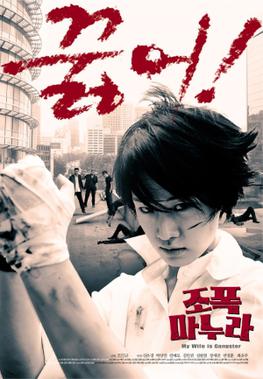“My Wife Is a Gangster” (2001) is a prominent South Korean action-comedy film that garnered significant attention both domestically and internationally for its unique blend of genres and its portrayal of a female gangster, a rarity in cinema. Directed by Jo Jin-kyu, the film is known for its distinctive style, humor, and action sequences.
Film Title and Release Year:
The film, titled “My Wife Is a Gangster,” was released in 2001. This title immediately captures the essence of the film’s unique blend of action and comedy, setting the stage for an unconventional cinematic experience.

Director:
Directed by Jo Jin-kyu, “My Wife Is a Gangster” reflects his ability to blend different genres to create a cohesive and entertaining film. Jo Jin-kyu’s direction is characterized by a careful balance of action, humor, and drama, making the film appealing to a wide range of audiences.
Genre:
The film seamlessly blends elements of action, comedy, and drama. It falls primarily in the action-comedy genre, with its well-choreographed fight sequences and its comedic take on the life of a female gangster balancing the more serious and dramatic moments.
Production Background:

Producing “My Wife Is a Gangster” involved integrating action-packed sequences with comedic elements, a challenge that the production team navigated skillfully.
The film was shot in various locations in South Korea, capturing the essence of Korean urban life. The production team worked closely with stunt coordinators and martial artists to choreograph the action sequences, ensuring authenticity and entertainment value.
Visual Style and Cinematography:
The film’s visual style is dynamic, featuring vibrant cinematography that complements its lively tone. The action scenes are particularly noteworthy for their inventiveness and execution.
The use of camera angles and editing in these sequences adds to the humor and intensity of the film.
Storyline and Plot:
Eun-jin is separated from her older sister Yu-jin when they were kids at an orphanage. While growing up, Eun-jin becomes a Kkangpae gangster and adopts the nickname “Mantis”.
Upon discovering that Yu-jin is suffering from cancer, Eun-jin demands the doctors to perform an operation, but they refuse.
The dying Yu-jin tells Eun-jin to marry as soon as possible, where Eun-jin goes on a blind date under the advice of her underling Romeo, who invited a stylist to design the appropriate makeup for Eun-jin.
However, the date becomes a disaster and Romeo is sent to find someone more suitable.

While Eun-jin is smashing up a car in retaliation against two men, a man ran up to protect her, but was accidentally hit in the head by Eun-jin. The man named Kang Soo-il is simple and kind-hearted.
He seems perfect for Eun-jin and later marries her. Yu-jin spoke to Eun-jin about her desire to have children and Eun-jin sets out to get pregnant. She forces her husband into several occasions of sexual intercourse.
While Eun-jin is out for a meal with her group, she is approached by a man from a rival gang called White Sharks. He is asked to leave after he had a drink from Eun-jin, but still lingered.
Annoyed, she stabs him in the head, barely missing his eyes. The next day, there is a meeting between Eun-jin and the White Sharks and a showdown is arranged between Eun-jin and Nanman.

Eun-jin and Nanman fought fiercely. It seemed that Nanman had the upper hand after stabbing Eun-jin. As he is about to finish her off, Eun-jin moves out the way and Nanman fell down a cliff.
Nanman manages to climb back up and tries to strangle Eun-jin. Eun-jin finds a way to escape and stomps on Nanman’s groin after she stabs the ground right next to his face, refusing to kill him.
Soo-il eventually finds that Eun-jin was a gangster after seeing her tattoo on her back and wanted her to give it up.
Eun-jin discoveres that she was pregnant and told Yu-jin. Later, Yu-jin dies in front of Eun-jin after telling Eun-jin that her baby deserves a father.
Later, Romeo dies in the arms of Sherry after being stabbed by five street punks. Sherry uses the public telephone to call Andy that Romeo has been stabbed.
Andy mistakenly believes it was Nanman and the White Sharks who killed Romeo and set out to take revenge on them. Upon arriving at the White Sharks’ warehouse, Andy and the rest of his group discoveres that they were heavily outnumbered.
The pregnant Eun-jin went out to fight the gangsters, but suffered a miscarriage after suffering a vicious attack by Nanman. Eun-jin tells Nanman to stop kicking her in the belly as she was pregnant.
Nanman then revealed that he has become a eunuch after his earlier showdown with Eun-jin.

As Nanman is about to stab Eun-jin, her boss turns up and pleads the White Shark to spare her life in exchange for some documents.
Soo-il finds out that Eun-jin is pregnant, where he takes revenge on White Shark by dousing the gang and him with kerosene. As he is holding up the lighter, Soo-il is restrained.
The White Shark foolishly ignites himself, along with 64 other men, when attempting to light his cigarette. Soo-il becomes the leader alongside Eun-jin, who is starting a showdown with another gang leader.
Character Development and Dynamics:
The character of Eun-jin, played by actress Shin Eun-kyung, is central to the film. She is portrayed as tough and skilled in combat, yet her attempts at domestic life and romance provide a humorous contrast to her gangster persona.
The film also explores her relationships with other gang members and her potential suitors, adding depth to her character and the story.
Themes and Cultural Context:

The film explores themes of family, identity, and the clash between traditional roles and modern life. It also offers commentary on gender roles, particularly in the context of Korean society, by portraying a strong, independent female lead in a typically male-dominated role.
Reception and Impact:
“My Wife Is a Gangster” was a commercial success in South Korea and gained popularity in various other countries, leading to two sequels due to its popularity.
It was praised for its originality, humor, and the performance of its lead actress. The film played a role in popularizing Korean cinema internationally, contributing to the rising interest in Korean films in the early 2000s.
Conclusion:
In summary, “My Wife Is a Gangster” stands out as an entertaining and innovative film in the landscape of South Korean cinema. Its unique blend of action, comedy, and drama, combined with a strong female lead and an engaging storyline, make it a memorable and significant film.
The film’s success helped pave the way for more diverse and creative storytelling in Korean cinema, showcasing the industry’s ability to produce genre-bending and internationally appealing films.


 Telegram
Telegram
 Facebook
Facebook